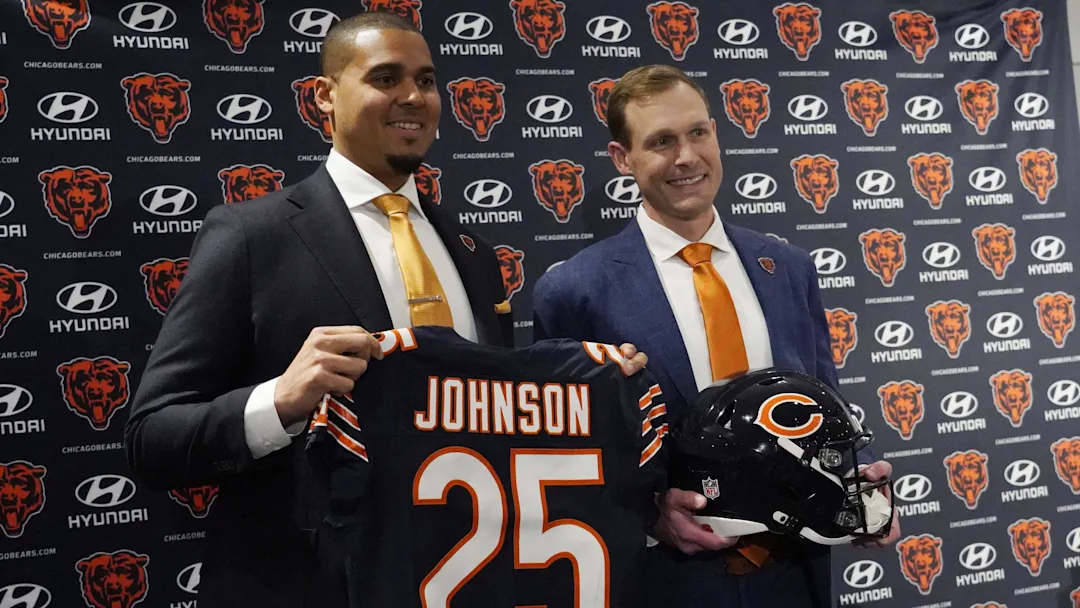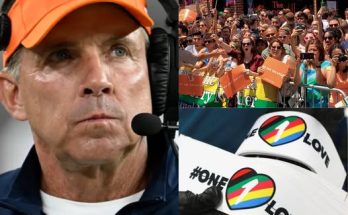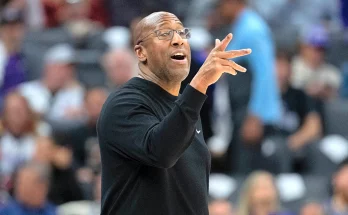After years of rebuilding and reimagining the future, the Chicago Bears are finally being recognized for something other than potential—they’re being praised for execution. This offseason, the Bears didn’t just make noise—they sent a message to the rest of the NFC North: they’re done playing catch-up. Multiple league insiders, analysts, and executives now agree that no team in the division had a better offseason than Chicago. From aggressive draft-day maneuvers to strategic free agency moves and a renewed sense of direction, the Bears have emerged as the biggest offseason winners in the NFC North, and possibly one of the most improved teams across the entire NFL landscape.
The pivotal moment that started turning heads came early in the offseason when the Bears officially moved on from Justin Fields, the quarterback they once believed could lead them into a new era. The move was bold, but necessary. Fields, despite his electric athleticism and highlight-reel plays, had yet to consistently prove he could be the long-term answer in Chicago. By trading him to the Pittsburgh Steelers and recouping draft assets, general manager Ryan Poles cleared the deck for a new beginning. That beginning came in the form of USC star quarterback Caleb Williams, who the Bears selected with the No. 1 overall pick in the 2025 NFL Draft—a pick they secured through a shrewd deal with the Carolina Panthers the previous year. That trade, which gave Chicago Carolina’s first-rounder in 2024, turned out to be a franchise-defining moment, allowing the Bears to draft arguably the most polished quarterback prospect since Andrew Luck.
Williams represents more than just a new quarterback. He represents hope, swagger, and belief. A Heisman winner who thrives on the big stage, he brings a dynamic presence both on and off the field. He has the arm talent to make every throw, the mobility to extend plays, and the leadership qualities that have already begun to shift the culture inside Halas Hall. From his first day at rookie minicamp, teammates and coaches have raved about his poise, command, and energy. There’s a growing feeling that this isn’t just another rookie quarterback—this is the guy. The Bears didn’t stop there. With their second top-ten pick, the one they earned with their own 2024 record, they selected Washington wide receiver Rome Odunze. A 6-foot-3 playmaker with elite route-running skills, Odunze adds another layer to an already impressive receiving corps that includes DJ Moore and veteran Keenan Allen. Drafting Odunze didn’t just give Williams another weapon—it completed what is now one of the best wide receiver trios in the entire NFL. For a franchise that has long struggled to find offensive consistency, the transformation is staggering.
Off the field, Ryan Poles has made calculated decisions that reflect a clear vision. He didn’t overspend, and he didn’t get caught up in splashy signings for the sake of headlines. Instead, he targeted value and leadership. The addition of veteran running back D’Andre Swift adds versatility to the backfield. On defense, the Bears re-signed cornerback Jaylon Johnson to a long-term deal, rewarding their homegrown talent and securing a shutdown corner for the foreseeable future. They also bolstered their defensive line by signing veteran edge rusher Jonathan Greenard and bringing in interior lineman Gervon Dexter Sr., who’s expected to take a significant leap this season.
This offseason wasn’t just about acquiring talent—it was about creating a balanced, sustainable roster with depth across all phases. The offensive line, a long-standing sore spot for the Bears, received attention as well. Poles invested in more competition at key spots and brought in experienced coaches to continue developing the young talent already in place. Caleb Williams will enter his rookie year with something very few No. 1 overall picks ever have: a legitimate supporting cast. That’s a credit to the front office, which refused to settle for a slow build and instead accelerated the timeline without compromising future flexibility.
What’s perhaps most encouraging for Bears fans is that, for once, the team looks aligned from top to bottom. Head coach Matt Eberflus enters a crucial year, but now he does so with a roster built to win. His defense, which improved dramatically in the second half of last season, should continue trending upward with added depth and a full offseason to gel. Offensive coordinator Shane Waldron, brought in from Seattle, brings a scheme designed to maximize quarterback efficiency and highlight the talents of a playmaking trio in Moore, Allen, and Odunze. There’s also a renewed energy surrounding the team’s leadership. President Kevin Warren, hired from the Big Ten Conference, has been instrumental in helping modernize the franchise’s infrastructure and push forward the Arlington Heights stadium project. For the first time in a long time, the Bears not only have talent—they have structure, clarity, and purpose.
Compare that to the rest of the NFC North, and it’s easy to see why Chicago is being praised. The Packers are banking on Jordan Love to repeat and sustain his late-season surge, but questions remain about their ability to protect him and the overall consistency of their young receivers. The Lions, while still the division favorite, are entering a tricky phase with rising expectations and a defense that has yet to prove it can hold up in critical moments. The Vikings, meanwhile, are in flux after moving on from Kirk Cousins and using a first-round pick on quarterback J.J. McCarthy, who likely needs time to develop before taking over. While those teams are either hoping for internal growth or waiting on new pieces to gel, the Bears have constructed a roster designed to compete immediately—while still possessing long-term upside.
Of course, success in the offseason doesn’t guarantee wins in September. The Bears still have to prove it on the field, and Caleb Williams will have his growing pains. But there’s a feeling in Chicago that the dark days are finally giving way to something brighter. Season ticket sales have surged, national TV appearances are expected to increase, and the Bears are being talked about with genuine respect, not pity or skepticism. This offseason was a turning point. The Bears didn’t just collect talent—they changed the narrative. They took bold swings and connected. They were aggressive without being reckless. They bet on a young quarterback, surrounded him with proven talent, and gave him a chance to lead a proud franchise back to relevance.
This kind of offseason doesn’t happen by accident. It’s the result of vision, patience, and execution. Ryan Poles deserves credit for not panicking when things didn’t go perfectly early in his tenure. He stayed the course, made tough decisions, and struck when the opportunity was right. Now, the Bears are no longer building for a vague future. They are ready to win—now and later. The NFC North may still run through Detroit for the moment, but the gap is closing fast. Chicago has the quarterback. They have the weapons. They have the defense. And they have a city that’s finally ready to believe again.
For a franchise that’s too often been a punchline or an afterthought, this offseason feels like a statement. The Bears aren’t rebuilding. They’re rising. And for the first time in a long time, it feels like they have the pieces to not just compete—but to conquer. This isn’t just hype. It’s progress. It’s momentum. And it’s a warning to the rest of the division: the Monsters of the Midway are waking up.


